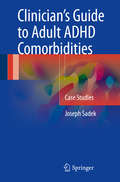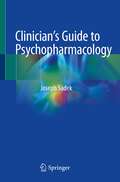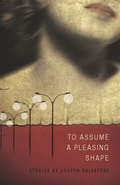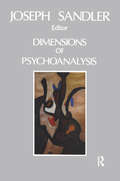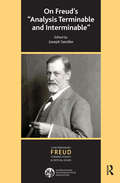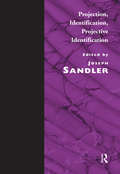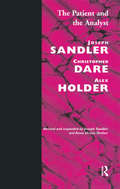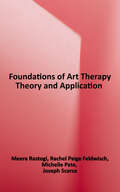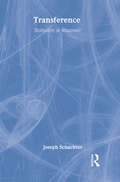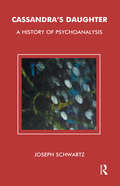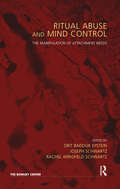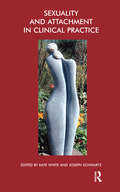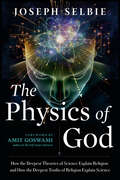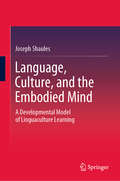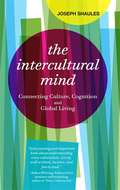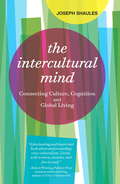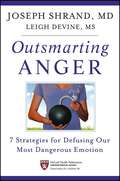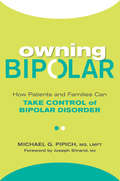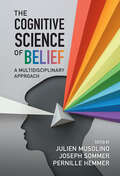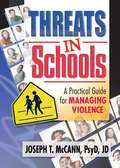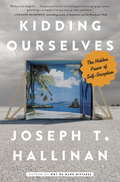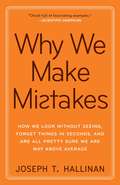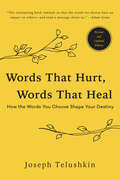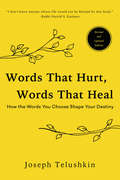- Table View
- List View
Clinician’s Guide to Adult ADHD Comorbidities: Case Studies
by Joseph SadekThe diagnosis and management of ADHD co-occurring with other disorders such as anxiety, depression and personality disorders remain major challenges for clinicians treating all age groups. This book guides clinicians through each step in the diagnosis and management of the comorbidities of adult ADHD on the basis of essential case studies describing psychiatric disorders that frequently occur with ADHD. Each case includes a diagnosis section and management section and is accompanied by questions and answers concerning the most important aspects in diagnosing and managing both ADHD and the comorbid disorders. Drawn from actual clinical encounters, the case studies also feature ample current and valid references.
Clinician’s Guide to Psychopharmacology
by Joseph SadekThis book employs a direct and clear approach to understanding the medications used in the treatment of psychiatric disorders. A range of areas, such as prescription errors, dosage modification in renal and hepatic dysfunction, augmentation strategies in treatment resistant patients, and recent findings from various clinical trials are addressed. Given its clear, straightforward approach, the book will be a valuable guide for all clinicians working with patients with psychiatric illness.
To Assume a Pleasing Shape
by Joseph SalvatoreA body-pierced goth girl cage-dances for a living while putting herself through school. A New York City academic reevaluates her closest relationships while considering breast-reduction surgery. A chatty Gulf War veteran is plagued by a sexual identity crisis. The characters in this debut short story collection search for meaning through the crucible of sex. Joseph Salvatore's top-notch literary writing coaxes readers into murky territories as characters spiral deeper into existential rabbit holes. Joseph Salvatore reviews fiction for The New York Times Book Review. He teaches at The New School where he founded their literary journal LIT. He lives in New York.
To Assume a Pleasing Shape (American Readers Series)
by Joseph SalvatoreA body-pierced goth girl cage-dances for a living while putting herself through school. A New York City academic reevaluates her closest relationships while considering breast-reduction surgery. A chatty Gulf War veteran is plagued by a sexual identity crisis. The characters in this debut short story collection search for meaning through the crucible of sex. Joseph Salvatore's top-notch literary writing coaxes readers into murky territories as characters spiral deeper into existential rabbit holes. Joseph Salvatore reviews fiction for The New York Times Book Review. He teaches at The New School where he founded their literary journal LIT. He lives in New York.
Dimensions of Psychoanalysis: A Selection of Papers Presented at the Freud Memorial Lectures
by Joseph SandlerThis book contains a selection of the Sigmund Freud Memorial Lectures on psychoanalytic psychology delivered by eminent British, French and American analysts, pointing out that there is a tendency to consider pathological processes in terms of the vicissitudes of the person's object relationships.
On Freud's Analysis Terminable and Interminable (Ipa - The Contemporary Freud: Turning Points And Critical Issues Ser.)
by Joseph SandlerA discussion by several analysts on the length of treatment, based upon Freud's paper, which is also included. Contributors include Andre Green, Arnold Cooper and David Rosenfeld.
Projection, Identification, Projective Identification
by Joseph SandlerThis book focuses on all aspects of projection and identification, and addresses the problems and perplexities of projective identification. It is based on the First Conference of the Sigmund Freud Center of the Hebrew University of Jerusalem.
The Patient and the Analyst: The Basis of the Psychoanalytic Process
by Joseph SandlerThis is a completely revised and enlarged edition of the well-known classic. In the twenty years since the previous edition was published much progress has been made in regard to the clinical concept of psychoanalysis, and this new edition brings the subject completely up to date. New knowledge of the psychoanalytic process has been added, together with advances in understanding the clinical situation, the treatment alliance, transference, countertransference, resistance, the negative therapeutic reaction, acting out, interpretations and other interventions, insight, and working through. The book is both a readable introduction to the subject and an authorities work of reference.
Foundations of Art Therapy: Theory and Applications
by Joseph Scarce Meera Rastogi Rachel P. Feldwisch Michelle PateThis is an essential and comprehensive introduction to the field of art therapy that blends relevant psychological and neuroscience research, theories, and concepts and infuses cultural diversity throughout each chapter. <p><p>The text includes full color photos, informative charts, and case examples and is divided into four parts beginning with the basics of art therapy knowledge and concluding with professional practices in art therapy. The fundamentals of art therapy section includes coverage of art therapy founders, art materials, multicultural perspectives, intersections with neuroscience, and research methods. <p><p>An overview and in-depth explorations of different theoretical approaches to the practice of art therapy are covered in the second part of the book. A bio-psycho-social approach integrates current research on art therapy with specific populations (children, mental health, older adults, and trauma). <p><p>The book concludes with art therapy professional practices in group concepts, community-based art therapy, and developing a career in the field. Each chapter contains chapter objectives, practical applications, ethical considerations, reflection questions, experiential exercises, and a list of terms. The unique, practical, and interdisciplinary approach of this text provides a solid base for understanding the field of art therapy and is well suited for use in undergraduate art therapy courses. This book will appeal to those who want an introduction to the field's theories, research, and practice and those seeking a comprehensive understanding on the foundations of art therapy.
Transference: Shibboleth or Albatross?
by Joseph SchachterThe theory of transference and the centrality of transference interpretation have been hallmarks of psychoanalysis since its inception. But the time has come to subject traditional theory and practice to careful, critical scrutiny in the light of contemporary science. So holds Joseph Schachter, whose Transference: Shibboleth or Albatross? undertakes this timely and thought-provoking task. After identifying the weaknesses and inconsistencies in Freud's original premises about transference, Schachter demonstrates how contemporary developmental research across a variety of domains effectively overturns any theory that posits a linear deterministic relationship between early childhood and adult psychic functioning, including the adult patient's treatment behavior toward the analyst. No less trenchantly, he shows how contemporary chaos theory complements developmental research by making the very endeavor of historical reconstruction - of backward prediction - suspect on logical grounds. Nor, Schacter continues, does the clinical evidence normally adduced in support of transference theory provide the firm bedrock of data that most analysts suppose to exist. What one finds, he holds, are endlessly reiterated claims of identifying determining historical antecedents sustained only by descriptions of current behaviors through a gloss of theory. Less a polemic than a call to order, Transference: Shibboleth or Albatross? is cogently argued and straightforwardly written. It is destined to be a thorn in the side of analysts who resist change and a spur to those who seek to bring analytic theory into closer alignment with contemporary science in the interest of improves treatment efficacy.
Cassandra's Daughter: A History of Psychoanalysis
by Joseph SchwartzThis work presents a complete history of psychoanalysis from its origins in 19th-century medical science to the end of the 20th century. The origins of psychoanalysis as well as the more immediate influences on Freud are explored, as is the way the discipline he founded has developed and changed.Joseph Schwartz first lays out the late Victorian approaches to mental illness and health and explains the context in which Freud's revolution took place. He traces the evolution of Freud's own thought, then shows how and why the rifts and shifts in the analytic community occurred. He then focuses on Freud's colleagues, rivals, successors and detractors - Jung, Adler, Sullivan, Melanie Klein, Erich Fromm to name a few. For once we see how the different schools and interpretations fit together - how they grew in response to each other, and what separate contributions each pioneer made over the last hundred years to create an effective understanding of the world of human subjective experience.
Ritual Abuse and Mind Control: The Manipulation of Attachment Needs
by Joseph Schwartz Orit Badouk Epstein Rachel Wingfield SchwartzPeople who have survived ritual abuse or mind control experiments have often been silenced, accused of lying, mocked and disbelieved. Clinicians working with survivors often find themselves isolated, facing the same levels of disbelief and denial from other professionals within the mental health field. This report - based on proceedings from a conference on the subject - presents knowledge and experience from both clinicians and survivors to promote understanding and recovery from organized and ritual abuse, mind control and programming. The book combines clinical presentations, survivors' voices, and research material to help address the ways in which we can work clinically with mind control and cult programming from the perspective of relational psychotherapy.
Sexuality and Attachment in Clinical Practice (The Bowlby Centre Monograph Series)
by Kate White Joseph SchwartzThis book is a selection of papers from the eleventh John Bowlby Memorial Conference. It covers the themes of sexuality and attachment, providing from a historical overview through intricate theoretical pathways to vivid descriptions to both analyst and analysand of a therapeutic relationship.
The Physics of God: How the Deepest Theories of Science Explain Religion and How the Deepest Truths of Religion Explain Science
by Joseph Selbie“An impressive and thought-provoking work . . . regarding the metaphysical mysteries of life, physical reality, and human consciousness. Highly recommended!” —Spirituality TodayScience and religion are often thought to be in conflict. But the contemporary fields of relativity, quantum physics, neuroscience, and more are in agreement with the transcendent phenomena described by saints, sages, and near-death experiencers. Today’s science actually provides profound insight into miracles, immortality, heaven, God, and transcendent awareness.The Physics of God describes the intersections of science and religion with colorful, easy-to-understand metaphors, making abstruse subjects within both science and religion easily accessible to the layman. This intriguing book:Pulls back the curtain on the light-show illusion we call matter.Connects string theory to religion’s transcendent heavens.Reveals the scientific secret of life and immortality.Demonstrates the miracle-making power of our minds to effect instantaneous physiological changes.Included in this revised edition is a new chapter on the physics of meditation and other updates.
Language, Culture, and the Embodied Mind: A Developmental Model of Linguaculture Learning
by Joseph ShaulesThere is an odd contradiction at the heart of language and culture learning: Language and culture are, so to speak, two sides of a single coin—language reflects the thinking, values and worldview of its speakers. Despite this, there is a persistent split between language and culture in the classroom. Foreign language pedagogy is often conceptualized in terms of gaining knowledge and practicing skills, while cultural learning goals are often conceptualized in abstract terms, such as awareness or criticality.This book helps resolve this dilemma. Informed by brain and mind sciences, its core message is that language and culture learning can both be seen as a single, interrelated process—the embodiment of dynamic systems of meaning into the intuitive mind. This deep learning process is detailed in the form of the Developmental Model of Linguaculture Learning (DMLL). Grounded in dynamic skill theory, the DMLL describes four developmental levels of language and culture learning, which represents a subtle, yet important shift in language and culture pedagogy. Rather than asking how to add culture into language education, we should be seeking ways to make language and culture learning deeper—more integrated, embodied, experiential and transformational. This book provides a theoretical approach, including practical examples, for doing so.
The Intercultural Mind: Connecting Culture, Cognition And Global Living
by Joseph ShaulesIn this pioneering book, Joseph Shaules explores exciting new research in cultural psychology and neuroscience, and explains how the new science of the mind can help us understand how the unconscious mind processes cultural differences, and how our sense of identity shapes how we view the world.The Intercultural Mind presents new perspectives on important questions such as:What is culture shock, and how does it affect us?Why are we blind to our own cultural conditioning?Can cultural differences be measured?What does it mean to have an international mindset?Illustrated with a wealth of examples and memorable stories, The Intercultural Mind is a fascinating look at how intercultural experiences can transform the geography of thinking.
The Intercultural Mind: Connecting Culture, Cognition, and Global Living
by Joseph ShaulesIn this pioneering book, Joseph Shaules presents exciting new research from cultural psychology and neuroscience. It sheds light on the hidden influence of culture on the unconscious mind, and helps people get more out of their intercultural journeys.The Intercultural Mind presents new perspectives on important questions such as: What is culture shock, and how does it affect us? Why are we blind to our own cultural conditioning? Can cultural differences be measured? What does it mean to have an international mindset? Illustrated with a wealth of examples and memorable stories, The Intercultural Mind is a fascinating look at how intercultural experiences can transform the geography of our minds.
Outsmarting Anger: 7 Strategies for Defusing Our Most Dangerous Emotion
by Joseph Shrand Leigh DevineSurefire strategies for transforming anger in yourself and others In this must-have resource, Dr. Joseph Shrand offers seven innovative yet remarkably uncomplicated strategies to help turn powerful anger impulses into positive, success-oriented actions. <P><P>These brain-based techniques teach you how to recognize the many forms of anger we all experience, and how to tap into your brain's very own anger absorption zone the prefrontal cortex. Dr. Shrand also explores the ways these techniques can be used to harness the anger of others. When we learn to recognize and defuse the anger response of any individual, we improve our chances for success in every aspect of life.Explains how the power of anger can be turned into much more productive behaviorsOutlines 7 simple strategies for outsmarting the lizard brain and the primitive limbic systemPublished in partnership with Harvard Health publications, a division of Harvard Medical SchoolOutsmarting Anger helps you manage and decrease not only your own anger, but the anger of people around you so everyone can be more successful.
Owning Bipolar: How Patients and Families Can Take Control of Bipolar Disorder
by Joseph Shrand Michael G. Pipich“Essential reading, not only for the person learning to own their bipolar, but for the support system members and treatment providers walking alongside them in their journey to hope and healing.” —Sally Spencer-Thomas, PsyD, president United Suicide Survivor’s International Knowledge is power, and grasping the basics of bipolar disorder can give you the power you need to detect it, accept it, and own the responsibility for treatment and lifelong disease management. With its three-phase approach, Owning Bipolar can help you and your loved ones become experts at an illness that has called the shots in your life for too long. Now it’s time for you to take control. · The Pre-stabilization phase and recognition: confronting the causes of bipolar and the effects, including depression, anxiety, loss of energy, avoidance of responsibilities, and suicidal thoughts · The Stabilization phase and acting on it: starting effective medication, accepting the disease, and treating different types of bipolar · The Post-stabilization phase and living with it: undertaking long-term maintenance, accepting your new identity, and coming to terms with your responsibilities, and the responsibilities of your caregivers Accessible and encouraging, and accented with empathetic first-hand stories from people who share the disorder, this book is a vital companion for readers to help them understand, treat, and live successfully with bipolar. “Will provide clarity and understanding to a seemingly complex and confusing psychiatric condition.” —David B. Weiss, MD, FAPA
The Cognitive Science of Belief: A Multidisciplinary Approach
by Julien Musolino Joseph Sommer Pernille HemmerBeliefs play a central role in our lives. They lie at the heart of what makes us human, they shape the organization and functioning of our minds, they define the boundaries of our culture, and they guide our motivation and behavior. Given their central importance, researchers across a number of disciplines have studied beliefs, leading to results and literatures that do not always interact. The Cognitive Science of Belief aims to integrate these disconnected lines of research to start a broader dialogue on the nature, role, and consequences of beliefs. It tackles timeless questions, as well as applications of beliefs that speak to current social issues. This multidisciplinary approach to beliefs will benefit graduate students and researchers in cognitive science, psychology, philosophy, political science, economics, and religious studies.
Threats in Schools: A Practical Guide for Managing Violence
by Joseph T MccannManage potentially violent situations in your school with these expert techniques!In the wake of several highly publicized school shootings, the problem of school violence has increasingly become a focus of concern for the general public as well as teachers, school officials, and students. Drawing on case studies from publicized violent incidents as well as from Dr. McCann's private practice, Threats in Schools: A Practical Guide for Managing Violence provides techniques for identifying, conceptualizing, assessing, and managing threatening behavior by students in school settings. Offering specific case management strategies for a variety of situations, this indispensable volume provides guidance on formulating questions to ask and suggestions for developing strategies for managing potentially violent situations.Integrating threat assessment and risk management models, this approach will help you target potential threats to property, other students, teachers, and school staff. The interdisciplinary approach recognizes that violent behavior is dependent on the characteristics of the perpetrator, victim, and setting, and that the relationship between threats and violence is not always clear. Threats in Schools offers well-grounded research, detailed case studies, and theoretical approaches to help you deal with the tough issues, including: zero-tolerance policies and their more effective alternatives why profiling techniques to identify violence-prone students are of limited use interventions to defuse potentially violent situations critical incident stress managementFive appendixes offer forms and checklists to help you plan and evaluate, including: threat assessment and management planning checklist of characteristics of perpetrators of school violence questions for evaluating general risk of violence fire-setting and bombing risk assessment sex offense risk assessmentLucidly written and illustrated with helpful tables and figures, Threats in Schools offers school officials, mental health professionals, community leaders, and the media the information they need to understand what sparks school violence and which approaches reduce the risk of it.
Kidding Ourselves
by Joseph T. HallinanFrom the Pulitzer Prize-winning journalist and author of Why We Make Mistakes, an illuminating exploration of human beings' astonishing ability to deceive themselves. To one degree or another, we all misjudge reality. Our perception--of ourselves and the world around us--is much more malleable than we realize. This self-deception influences every major aspect of our personal and social life, including relationships, sex, politics, careers, and health. In Kidding Ourselves, Joseph Hallinan offers a nuts-and-bolts look at how this penchant shapes our everyday lives, from the medicines we take to the decisions we make. It shows, for instance, just how much the power of many modern medicines, particularly anti-depressants and painkillers, is largely in our heads. Placebos in modern-day life extend beyond hospitals, to fake thermostats and "elevator close" buttons that don't really work...but give the perception that they do. Kidding Ourselves brings together a variety of subjects, linking seemingly unrelated ideas in fascinating and unexpected ways. And ultimately, it shows that deceiving ourselves is not always negative or foolish. As increasing numbers of researchers are discovering, it can be incredibly useful, providing us with the resilience we need to persevere, in the boardroom, bedroom, and beyond. Provocative, accessible, and easily applicable to multiple facets of everyday life, Kidding Ourselves is an extraordinary new exploration of our mind's flexibility.
Why We Make Mistakes: How We Look Without Seeing, Forget Things in Seconds, and Are All Pretty Sure We Are Way Above Average
by Joseph T. HallinanWe forget our passwords. We pay too much to go to the gym. We think we'd be happier if we lived in California (we wouldn't), and we think we should stick with our first answer on tests (we shouldn't). Why do we make mistakes? And could we do a little better?We human beings have design flaws. Our eyes play tricks on us, our stories change in the retelling, and most of us are fairly sure we're way above average. In Why We Make Mistakes, journalist Joseph T. Hallinan sets out to explore the captivating science of human error--how we think, see, remember, and forget, and how this sets us up for wholly irresistible mistakes.In his quest to understand our imperfections, Hallinan delves into psychology, neuroscience, and economics, with forays into aviation, consumer behavior, geography, football, stock picking, and more. He discovers that some of the same qualities that make us efficient also make us error prone. We learn to move rapidly through the world, quickly recognizing patterns--but overlooking details. Which is why thirteen-year-old boys discover errors that NASA scientists miss--and why you can't find the beer in your refrigerator. Why We Make Mistakes is enlivened by real-life stories--of weathermen whose predictions are uncannily accurate and a witness who sent an innocent man to jail--and offers valuable advice, such as how to remember where you've hidden something important. You'll learn why multitasking is a bad idea, why men make errors women don't, and why most people think San Diego is west of Reno (it's not).Why We Make Mistakes will open your eyes to the reasons behind your mistakes--and have you vowing to do better the next time.
Words That Hurt, Words That Heal, Revised Edition: How the Words You Choose Shape Your Destiny
by Joseph TelushkinFrom the New York Times bestselling author of Rebbe comes this newly revised edition of Words That Hurt, Words That Heal—an invaluable guide in how choosing the right words can enrich our relationships and give us insight to improve every facet of our lives.“I don’t know anyone whose life would not be blessed by this book.”—Rabbi Harold S. Kushner, author of When Bad Things Happen to Good People and Nine Essential Things I’ve Learned About Life Joseph Telushkin is renowned for his warmth, his erudition, and his richly anecdotal insights, and in Words That Hurt, Words That Heal he focuses these gifts on the words we use in public and in private, revealing their tremendous power to shape relationships. With wit and wide-ranging intelligence, Rabbi Telushkin explains the harm in spreading gossip, rumors, or others’ secrets, and how unfair anger, excessive criticism, or lying undermines true communication. By sensitizing us to subtleties of speech we may never have considered before, he shows us how to turn every exchange into an opportunity.In this fully revised edition, Joseph Telushkin brings this classic into the modern age. Remarkable for its clarity and practicality, Words That Hurt, Words That Heal illuminates the powerful effects we create by what we say and how we say it.
Words That Hurt, Words That Heal: How To Choose Words Wisely And Well
by Joseph TelushkinJoseph Telushkin is renowned for his warmth, his erudition, and his richly anecdotal insights, and in Words That Hurt, Words That Heal he focuses these gifts on the words we use in public and in private, revealing their tremendous power to shape relationships. With wit and wide-ranging intelligence, Rabbi Telushkin explains the harm in spreading gossip, rumors, or others' secrets, and how unfair anger, excessive criticism, or lying undermines true communication. By sensitizing us to subtleties of speech we may never have considered before, he shows us how to turn every exchange into an opportunity. Remarkable for its clarity and practicality, Words That Hurt, Words That Heal illuminates the powerful effects we create by what we say and how we say it.
